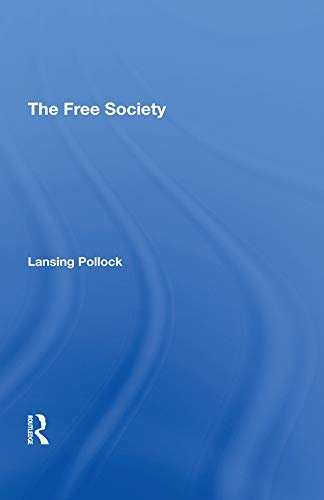
The Free Society (English Edition)
- 作者
- Lansing Pollock
- 语言
- 英语
- 出版社
- Routledge
- 出版日期
- 2019年7月11日
- 纸书页数
- 230页
- 电子书格式
- epub,pdf,mobi,azw3,txt,fb2,djvu
- 文件大小
- 1995 KB
- 下载次数
- 6010
- 更新日期
- 2023-08-02
- 运行环境
- PC/Windows/Linux/Mac/IOS/iPhone/iPad/iBooks/Kindle/Android/安卓/平板
内容简介
In the tradition of Milton Friedman’s 1962 classic, Capitalism and Freedom, Lansing Pollock draws on moral, political, and economic theory to defend a libertarian vision of the good society. Pollock argues that mutual consent, derived from a fundamental Kantian moral equality, is the ideal standard for judging relations between persons. He contends that if the equal right of all persons to be free is taken seriously, most of the coercion by government that many take for granted is immoral. Pollock situates libertarian moral theory in an American historical context, one compatible with the views of James Madison and Thomas Jefferson. Pollock argues that when the Constitution is interpreted according to the political philosophy of the framers, the modern welfare state is unconstitutional. Pollock goes on to demonstrate how free market economies promote human well-being, whereas government regulation is often counterproductive. In advocating a reduction in the size and scope of government, Pollock includes applied policy analyses of poverty and health care, among other topical issues. He also offers an innovative solution to the problem of funding a limited government without violating individual rights. The strength of The Free Society lies in its synthetic achievement. In a book that is accessibly written and sure to appeal to scholar and lay reader alike, Pollock provides a compelling conception of the good society—one in which the libertarian vision includes moral, social, political, and economic perspectives.
The Free Society (English Edition) EPUB, PDF, MOBI, AZW3, TXT, FB2, DjVu, Kindle电子书免费下载。
- 物业岗位设置与管理制度全案 福田物业项目组
- Common Legal Framework for Takeover Bids in Europe: Volume 1 (Law Practitioner Series) (English Edition) Dirk Van Gerven
- The United States And Saudi Arabia: Ambivalent Allies (English Edition) David E. Long
- Mathematics for Electrical Technicians: Level 4-5 (Longman Technician S) (English Edition) John Bird、Antony J.C. May
- 城镇基础设施投融资:理论、政策与实务 祁玉清
- Science, Technology, And Policy Decisions (English Edition) Anne L. Hiskes、Richard P. Hiskes
- Children and Families in Health and Illness (English Edition) Marion E. Broome、Kathleen A. Knafl、Suzanne L. Feetham、Karen Pridham
- Czechoslovakia in European History (Routledge Revivals) (English Edition) S. Harrison Thomson
- Incorporation, Authorship, and Anglo-American Literature (1815–1918) (Routledge Studies in Nineteenth Century Literature) (English Edition) Jasper Schelstraete
- The Politics Of Divided Government (English Edition) Gary Cox、Samuel Kernell
- 父与子全集(80周年全彩典藏版,陪伴几代读者的经典。只要世界上还有父子深情在,《父与子》的故事就会一直为人们带来欢乐。) 卜劳恩、李彩萍
- 奔跑吧 Linux内核(异步图书) 张天飞
- Foundations of Environmental and Occupational Neurotoxicology (English Edition) Jose A. Valciukas
- 教师的解放与超越(李镇西老师全新力作:深入教师心灵,解放旧有观念,超越当下智慧,做更卓越的自己) 李镇西
- Communication in the Design Process (English Edition) Stephen A. Brown
- Monetary Policy and Crises: A Study of Swedish Experience (Routledge Library Editions: Monetary Economics Book 8) (English Edition) Brinley Thomas
- 静默(在法国,每2分钟就有人从书店把《静默》带回家!改编电影法国票房超过《王牌特工》3.6倍!我的父母是聋哑人,我不是。) 维罗妮克•普兰、袁筱一
- The Changing Culture of a College (Routledge Library Editions: Sociology of Education Book 24) (English Edition) John Frain
- The Age of Oligarchy: Pre-Industrial Britain 1722-1783 (Foundations of Modern Britain) (English Edition) Geoffrey Holmes、D. Szechi
- 财产与责任保险 郭蕙兰,李辉,张建深
- 金字塔原理(四大实用法则,立足于真实案例,更适应中国的职场模式。) 吴峥
- 悲惨大学生活漫画版1-3(套装共3册)【经典花美男杂志《男朋友》人气第一漫画!风弄经典校园小说,阳光·真腹黑表哥VS傲娇·口严正直体表弟,在这个火辣辣的夏天为你上演欢乐逗趣的校园轻喜剧,给你带来透心凉的感觉!】 风弄
- 文心雕城:近代以来夏河城镇化进程研究 郭志合
- Concrete Pavement Design, Construction, and Performance (English Edition) Norbert Delatte
- 区块链与数字经济 高航、陈志钧
- 每一个优秀的人,都有一段沉默的时光 这么远那么近等
- 中国外商投资法律制度 苏东
- Diabetes: Translating Research into Practice (Translational Medicine Book 9) (English Edition) Carla J. Greenbaum、Leonard C. Harrison
- Data, Models and Analysis: The Highest Impact Articles in 'Atmosphere-Ocean' (English Edition) Guoqi Han、Hai Lin、Douw Steyn
- The Theming Of America: Dreams, Visions, And Commercial Spaces (English Edition) Mark Gottdiener